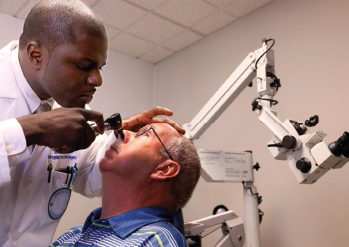Most people are fortunate if they find a career they love. Nigerian-born Samkon Gado, MD, has had the good fortune to have found two careers to love—professional football and medicine. Dr. Gado played for several different teams as a running back in the NFL, including the Kansas City Chiefs, Green Bay Packers, Houston Texans, Miami Dolphins, and St. Louis Rams. He’s currently in his fourth year of residency in the St. Louis University Hospital Otolaryngology Program.
Explore This Issue
January 2019ENTtoday: You moved from Nigeria to Columbia, S.C., when you were young, and played quite a few sports, including football, track, soccer, and basketball. What made you choose football?
Dr. Gado: I’m not sure whether I chose football, or football chose me. Although I love a lot of different sports, my body was really best suited for football. I’m fast, but not fast enough for track, too big for soccer, and not tall enough for basketball. I enjoyed football, and with what God gave me in terms of height and speed, I felt that it was the sport in which I could continue to excel.
ENTtoday: Do you have a favorite memory of your time in the NFL?
SG: There are three that come to mind. On my 23rd birthday I had my first NFL start, playing the Atlanta Falcons. It was the closest game to my hometown I had ever played, and most of the people who had loved and supported me were able to come watch me play. It was a good game (we won!).
The second would be when I met my wife while playing for the St. Louis Rams. She had just graduated from the University of Illinois with a degree in molecular and cellular biology and needed a part-time job before graduate school. She was working for the catering company that catered our lunches and was filling in for someone who couldn’t make it that day. We got into a chance conversation about organic chemistry and theology, and everything went from there. We’ve been married for nine years now.
Football is very fast and the toughest adjustment to the game is to the pace in which the game is played. … I’m finding my medical training to be similar: At a certain point, you stop thinking and begin anticipating. The bigger picture becomes clearer.
Finally, a game on Dec. 11, 2005, against the Detroit Lions was probably the best game I had as a professional football player. Football is very fast and the toughest adjustment to the game is to the pace in which the game is played. During that game, I didn’t have to expend bandwidth thinking about what to do next. I started anticipating instead of reacting. I’m finding my medical training to be similar: At a certain point, you stop thinking and begin anticipating. The bigger picture becomes clearer.
ENTtoday: What made you decide to go into medicine, and why otolaryngology?
SG: My friend’s dad, Rick Milne, was an ophthalmologist, and he supported me tremendously growing up. He was a good man in every sense of the word—he invested in me at a young age and made doctoring worth emulating.
Also, biology class in my sophomore year in high school was the first time I did really, really well in class. I wasn’t a lazy student, but school was always work for me. In biology, for the first time it didn’t seem like work. I’d taken science classes before, but between Dr. Milne’s influence and my interest in biology, I thought maybe I could become a physician.
At the time I wanted to go into ophthalmology, but my best friend and college roommate changed my thinking. We played all four years of college football together and were both pre-med, but I went to NFL and he went to medical school. I enrolled in the Medical University of South Carolina where he was doing his otolaryngology residency and, through him, I got a chance to get to know the department and develop a love for the specialty. I felt like these people were my tribe.
ENTtoday: What are your plans for performing missionary work in your native Nigeria?

Dr. Gado with a patient.
SG: I’ve been back several times to visit, and just went back this January for the first time as a physician. It gave me a clearer vision of how I could affect health care there. I envision a surgery center that focuses on procedures that are mostly outpatient; the beauty is otolaryngology is really suited for quick outpatient procedures. Finishing my residency is the next step, though, and then learning as much as possible. I need to better understand all the details that are necessary to make it a reality. I think it’s a culmination of all the goodwill poured into me. I’m standing on the shoulders of great men and women; I never would have gotten this far without the support of so many others in my life. I think if you have the opportunity to invest in otolaryngology students and residents, seize that opportunity. Your support can have a powerful and difference-making influence.
Amy E. Hamaker is a freelance medical writer based in California.